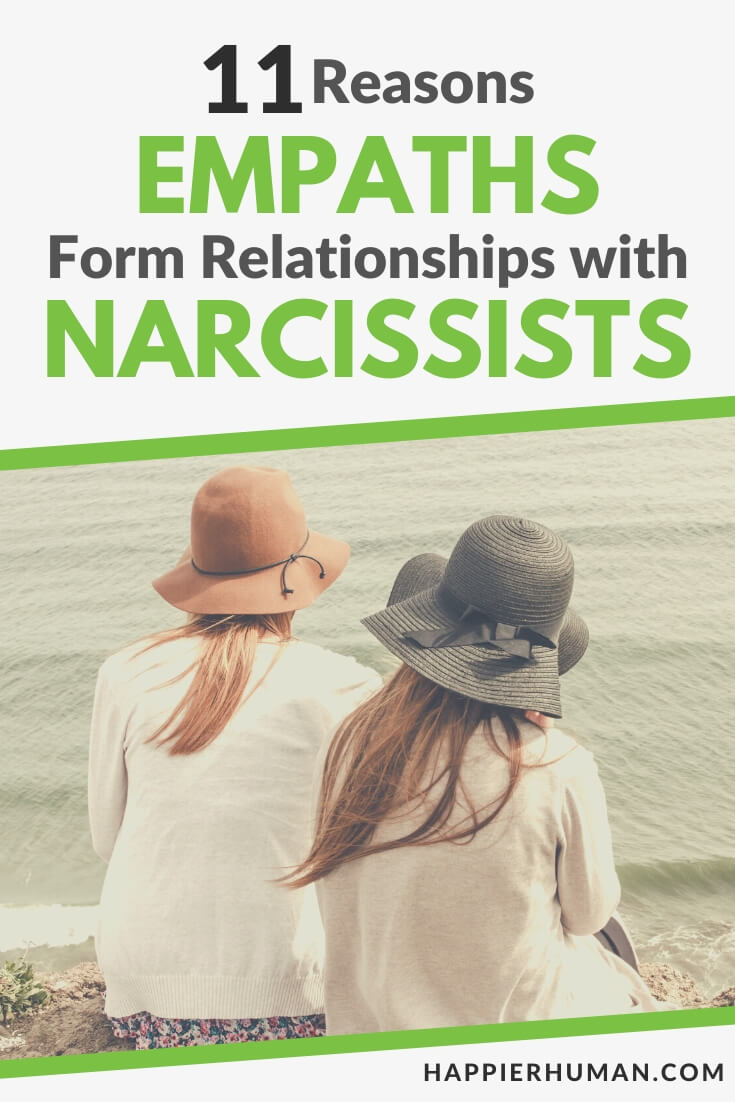Have you ever been in a relationship with someone who seemed to take more than they give? On top of being extremely selfish, did the person exhibit absolutely no remorse in how their actions affected you, or worse, blame you for their behavior?
If the answer is yes, you may have been in a relationship with a narcissist… and don’t want to make that mistake again!
If you find yourself affected on a deeper level than the average person, you may be an empath. After all, empaths tend to feel deeply, so the experience of crossing paths with and becoming connected to a narcissist may cut like a sharp knife.
But why would an empath – someone who is naturally sensitive to the needs of others – be drawn to this type of person? In this article, we will explore some reasons why empaths form relationships with narcissists and how they can deal with it.
What Is an Empath?
An empath is someone who is highly sensitive and puts others’ needs before their own. They are naturally kind, compassionate and caring. They can pick up on the emotions of those around them and absorb them, as if they were their own.
This may make life difficult for an empath as they struggle to find a balance between taking care of themselves and helping others.
What Is a Narcissist?
The complete opposite of empaths, narcissists have an inflated sense of self-importance, believing they are superior to others. They are only looking out for themselves, often leaving behind a path of emotional devastation for those they have relationships with.
In fact, narcissists lack empathy altogether and display selfish behavior… failing to recognize the feelings of those around them, while manipulating situations to their own advantage.
What Makes Someone Prone To Being Either an Empath or Narcissist?
Studies have found that the propensity for being an empath or a narcissist is largely determined by genetics and early life experiences. Research has also shown that those who are more prone to be empaths tend to come from a background of chaos, neglect, or abuse.
Such chaos can lead empaths to unconsciously seek out relationships with narcissistic people in an effort to make sense of their past.
On the other hand, those who may become narcissistic often experienced excessive praise and love as children. An example of a well-known narcissist was Kim Jong-il, the former leader of North Korea. He was raised to believe he was the chosen one and that those around him should be servile.

Then there was Scott Peterson, who murdered his wife and unborn child. He was said to have had an inflated sense of self-worth, believing himself to be above accountability and consequence.
While not all narcissists may go to the extremes these individuals did, they are certainly capable and always calculating their next move to put themselves on top.
Now that we understand what makes each personality type unique, let's take a look at why an empath might form a relationship with a narcissist.
11 Reasons Why Empaths Form Relationships with Narcissists
1. Unyielding Human Compassion
Due to their heightened sense of understanding and compassion, empaths may find themselves drawn to people in need. Unfortunately, this can mean they are easy targets for those who have narcissistic tendencies and are looking for someone to take advantage of.
Let's not forget how manipulative a narcissist can be. It's easy for them to initially draw a compassionate empath in by pretending to be vulnerable and in need of help.
2. Misguided Sense of Loyalty
Once an empath has taken the bait, they may form an emotional connection with the narcissist and feel a misguided sense of loyalty towards them. This can make it hard for an empath to recognize when the relationship has become toxic, as the empath may feel obligated to stay and try to help.
For example, in the biographical film, “What's Love Got to Do with It“, Tina Turner tearfully laments to her friend that despite the domestic abuse… she couldn't leave Ike because she knew what it was like to be abandoned by her family.
3. Comfort in Familiarity
A feeling of familiarity may draw the empath to the narcissist. Having experienced chaos and neglect in their past, being with someone who exhibits narcissistic tendencies may not be a big deal for many empaths.
While it may sound crazy, being around a narcissist can be normal for an empath. It can be a dynamic they’re used to and understand, even if it may be unhealthy. Plus, if this is the only type of dynamic the empath has even known, they simply have nothing else to measure it against.
4. Unfulfilled Need for Love and Support
Empaths are often the ones giving out support and love, so when a narcissist appears to need their help, it can be easy for them to get sucked in. Empaths feel an innate need to help those who appear to need it, and so they may pour their heart and soul into the narcissistic relationship to “fix” the person.
The empath may not realize until it's too late that the narcissist is using them for their own gain, and not to help or love them in return.
5. Codependency
Codependency means that one person relies on the other in an unhealthy way. It doesn’t just happen between two people who are romantically involved, it can also occur with family members, friends or acquaintances.
Empaths can also develop a codependent relationship with narcissists, as they feel like they need the person to survive. This type of codependence can be difficult for the empath to overcome, as they may feel like they are unable to live without the narcissist in their life.
As mentioned above, the narcissist's never-ending needs may fulfill some empath's unwavering desire to be the person that others need.
Codependency is more common than many people realize and can be detrimental to the empath’s well-being. As a result, an empath must be able to recognize signs of codependency to protect themselves from being taken advantage of by narcissistic minded souls.
6. Fear of Abandonment
Feelings of being abandoned or overlooked often plague the empath, and so this can make them desperate for love and attention from anyone willing to give it. Unfortunately, narcissists can be experts in manipulating those who they come into contact with, and can take advantage of the empath’s need for affection.
They know that by staying with the person, regardless of how unhealthy the relationship is, they won't have to face being alone. This can lead them to stay in a situation that isn’t beneficial for them or their mental health.
7. Lack of Self-Worth
An empath's lack of self-worth can make it difficult for them to recognize when they are being taken advantage of. An empath's feelings of worthlessness can make them believe that they don't deserve any better than the narcissistic relationship they are in.

This lack of self-worth can also lead to an empath believing that if they stay, the narcissist will eventually change and it'll be a happy ending for both parties. Unfortunately, this isn't usually the case as narcissists rarely change their behavior.
8. Seeking Approval
Low self-esteem can lead an empath to seek approval from others, especially those in positions of power. The narcissist may appear to the empath as a source of admiration and respect, when they are actually just looking to control the other person.
The empath may be so desperate for approval that they overlook the controlling behavior or simply accept it as part of their relationship dynamic. This can be extremely damaging to an empath's self-esteem, as they may eventually believe that they need the narcissist for validation and will accept whatever treatment is given to them.
9. Search for a Connection
Empaths are natural nurturers who crave connection with someone or something. This need for companionship and understanding can make them vulnerable to manipulation by a narcissist.
Narcissists can be very persuasive and convincing, making it easy for the empath to become emotionally attached to them. The narcissist may also use their charm to make the empath feel special, which is something the empath craves – even if it's not genuine or healthy.
10. Unconsciously Recreating Past Traumas
Empaths may also be drawn to a narcissist because of unresolved trauma from their past. If an empath had a parent or primary caregiver who was narcissistic, it can lead them to unconsciously seek out similar relationships in the future.
This type of relationship dynamic can leave the empath feeling both safe and familiar, as it is similar to the situation they experienced in childhood. However, this dynamic can also be extremely damaging and can lead to further emotional trauma for the empath if it isn't addressed.
11. Lack of Healthy Relationship Reference
An empath may also find themselves in a relationship with a narcissist if they don’t have any healthy models of relationships from which to learn.
For example, if an empath is raised by two narcissistic parents or has had multiple unhealthy relationships in the past, it can make it difficult for them to recognize when someone is taking advantage of them.
Without any healthy references, the empath may think that this type of relationship is normal and will believe that if they stay with the narcissist, it can eventually become a healthy relationship. Unfortunately, this isn't usually the case as narcissists rarely change their behavior.
These are just a few of the reasons why empaths form relationships with narcissists. It's important to remember that empaths, like all people, deserve love and respect and should never stay in an unhealthy or abusive relationship.
The Potentially Dangerous Side Effects of a Relationship between an Empath and Narcissist
Being in a relationship with a narcissist can be extremely damaging to an empath's physical, mental, and emotional wellbeing. A narcissist's inability to empathize, or take responsibility for their actions, can lead to the empath feeling drained, anxious, and depressed.
The empath may also feel taken advantage of, manipulated, and disrespected in the relationship… which can cause long-term damage to their self-esteem. Additionally, if the empath is constantly trying to meet the narcissist's needs without having their own met, they may begin to feel resentful and unappreciated.
Suggestions for Changing or Ending the Relationship
If you're in a relationship with a narcissist, it's important to remember that you are not responsible for their behavior. You can't change them or make them treat you better… no matter how hard you try.
The best things you can do are set boundaries and learn to put yourself first. This means having your own interests, hobbies, and activities that bring you joy and fulfillment. It also means not compromising your own values or feelings to please the narcissist.
If you are an empath, being in a relationship with a narcissist is like being stuck on an emotional seesaw… where you are just going through the motions while suffering through constant highs and lows that happen too quickly to make sense of.
Still, some empaths want to try and make it work… even if it is an uphill battle that never gets them very far. They are wired to repair even what can’t be fixed.

Conversely, if you find that the relationship is too toxic and damaging, it may be best to end it altogether. This can be a difficult decision to make, but ultimately, it's important to prioritize your mental health and wellbeing. There is no shame in ending a relationship if it's not healthy for you.
A Narcissist’s Tricks to Make You Stay
When you are trying to end a relationship with a narcissist, it can be difficult as they may try to manipulate or guilt-trip you into staying. They may even threaten to hurt themselves if you don't stay in the relationship.
As horrible as these tricks are to witness, it is important to remember that these threats are not real… and the narcissist will likely move on quickly after you end the relationship. And if a narcissist threatens to hurt himself, let them know you plan to call a crisis hotline or seek help from a mental health professional.
Three Steps to End the Relationship with Minimal Fallout
Ending any relationship can be hard, but you must use extra precautions with a narcissist.
Step 1. Neutral Meeting Place
You may ask to meet them in a public or neutral place and explain to them why you are ending the relationship. Narcissist or not, they won’t attack you in public. If they do, they are mentally ill and need more help than you can give them.
Step 2. Control Your Emotions
Keep your emotions in check and make sure to stay calm and respectful throughout the conversation. Don't react if they become angry, as this will only give them more power over you.
Step 3. Cut Off Communication
It is also important to make sure that all communication between you ends immediately after the breakup, so that they can't try to manipulate you into getting back together. In other words, wipe them from your social media and block their phone number.
The person may go as far as to use other channels of communication, like calling you from a new number or connecting through a mutual friend. Don't fall for the bait.
By following these steps and putting your mental health first, you can end the relationship in a healthy way – on your own terms – and begin to heal. Remember that empaths are strong, resilient people who deserve love and respect. It is okay to leave an unhealthy relationship if it is not benefiting your well-being.
Final Thoughts on Empath and Narcissist Relationships
While the caring and emotional empath may seem like an odd match for the self-absorbed narcissist, these relationships do happen. Empaths may find themselves in relationships with narcissists, either due to a lack of experience or past trauma.
Regardless of how they ended up there, once they recognize the signs of an unhealthy relationship, it's never too late to take steps to protect themselves from further harm.
You are worthy of love and respect and deserve to be in a relationship with someone who will treat you as such. Having been in a relationship with a narcissist doesn't define your worth or make you any less deserving of genuine, unconditional love. It simply means you have the strength and courage to realize that it's time for a change.
By recognizing the signs you're dealing with a narcissist, empaths can take control over their own lives and make healthier choices when it comes to relationships. With this knowledge, they can be empowered to seek out healthy relationships that nurture their souls.
In the end, finding joy and fulfillment in life is possible by being true to yourself and your own needs. If you are dealing with a narcissist at home, or at work, check out our read on 15 Ways to Make a Narcissist Miserable.
Finally, if you want to identify YOUR personality type, then take one of these 11 personality tests to better understand what makes you tick.


